Part One of my treatise on how society can and should function, using axiomatic a priori & logic.
This series will delve into the logic of how to have an optimal (not utopian) society. Part one delves into the axiomatic logical basis behind reality, as well as laying the ground work for a logical proof to voluntaryism. Part two will define how rights must work for society to be free, and Part three will lay out a logically derived implementation framework for Voluntaryism, built upon the previous two parts.
Preamble
My largest challenge as a Voluntaryist, apart from living free of course, is trying to explain logically to people why government should be avoided, and the free market lauded. We all have grown up with the state, and have come to rely on it to answer hard questions on our behalf. The trouble isn't when those questions are answered and dealt with in a way that satisfies us. Our societal issues arise usually when the state works against our interests.
As it stands today, voting is not a means for people to affect control over any state, and getting states to relinquish power they held historically often has required a total collapse to occur first. Several years ago I realised all this, and it has taken me the time since then to refine the logic of an optimal system for society that factors out the need for states entirely.
So I decided to take a look at the root causes of our societal problems, and sought basic axiomatic (self evident & unquestionable) truths that can explain them. With that information, we can begin to work on a logical societal foundation for all mankind to benefit from. Without doing that, we will continue to be adrift at sea upon the whims and whimsy of others, unable to live as proper adults, and being viewed as merely old children by those around us. So without further ado...
The Logical Proof of Voluntaryism - The Axioms of Reality
Whatever solution to societal structure is proposed, it has to pass a form of litmus test. For most, that test may be quite basic, along the lines of "my interests/needs are met". For me, it is much more complex, and needs to be analysed from the core outwards, rather than trying to hotfix repeating problems.
To do this, we need to establish some basic axioms. First let's establish something critical to the discussion: the nature of reality, as a human being experiences it.
AXIOM 1: All interpretations of reality are subjective.
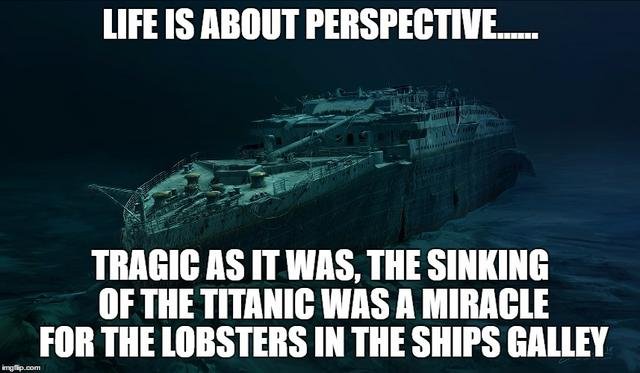
Our minds are limited by the amount of data we can take in, and as such we do not see the whole picture. Despite the many things we can do, there is a wide spectrum of data unavailable to each of us on a regular basis. No two minds are identical in their interpretation of the same data either. Just talk to someone color blind, like me, or read my "Brain Essays" collection on G+ for more details.
This is how all thought processes work - we take in information, and based on other forms of information we have experienced, we extrapolate our current reality from the inputs we receive. The data varies from individual to individual, and thus the extrapolations must also vary. Two may come to the same conclusion for very different reasons, and from very different perspectives, but it's just as likely that they won't. As such, a single, monopolistic solution, like a state or a corporation, is never viable for everyone. It is only viable for those whose perspectives align with the ones in charge of the system itself.
PROBLEM 1: SUBJECTIVE PERSPECTIVE OVERLOAD
The subjective reality axiom presents a critical problem to any system of governance for all society. If all interpretation is subjective, then the probability that 300 million, let alone 7 billion, different minds will consider the same data point, process, or result in the same way is negligible. I personally would argue it is so insignificant a probability, it approaches the impossible. If that is the case, how can an objective reality exist for us, if everything is interpreted subjectively by everyone?
Logically, some kind of objective reality must exist. Even if the tools we use to observe it cannot provide us with the means of experiencing all of it, we exist, and the world exists, so logically, what we experience must have some way of being defined objectively. It is just a matter of determining how to define it. There has to be a way to find an objective truth between two sapient beings, and thankfully there is one.
AXIOM 2: Voluntary Agreements are Objective to Those Involved
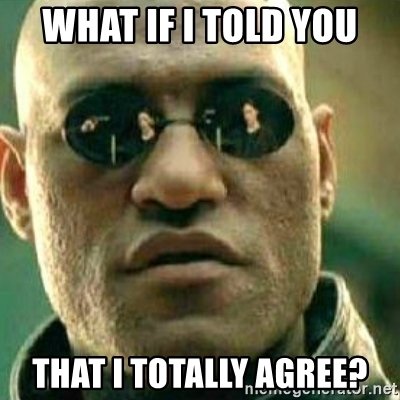
Our society needs a way to navigate this minefield of subjective interpretation. However, we do have a tool for generating an objective reality in a microcosm within the world. That tool is the ability to agree.
If two subjective interpretations of reality come to an agreement on a given issue, that issue for those in agreement now has an objective interpretation. This allows all of us to navigate in a world with so many minds & varying thoughts. There doesn't need to be an absolute consensus among all mankind for any exchange between individuals to occur. There only needs to be one between the parties involved in the exchange to make that an objective component of their reality.
This axiomatic a priori allows us to craft an objective reality for us, and those we interact with. It also allows us to move forward with others, rather than against them. By agreement and via citation & logic, we advance in the fields of science. By agreement and signed contracts, we advance the economy. By agreement and love, we get married and further the species.
PROBLEM 2: IDENTIFYING TRUTH
Although consent & agreement works to define an objective reality, it doesn't guarantee that reality is correct, or true, in its interpretation. We have had to change our minds about many things as our society has evolved, and what we agreed was once true has been categorically proven false in many cases (the morality/ethicality of slavery, the position of our planet in the universe, you name it, we've changed our minds on it). Even today our minds are consistently changing on what is truth, and how we can identify it.
So how can we objectively prove what is true, when all interpretation is subjective? Thankfully, there is a solution here too.
AXIOM 3: Only Logic + Data Can Determine Viability or Truth
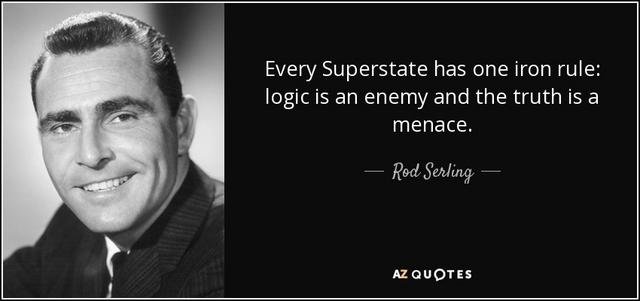
All science, mathematics, and even the concept of reason itself are firmly grounded in the basis of Logic. Logic is a process, not an opinion. In other words, there is no my or your logic. There is only logic, and something can either be logical or not. I really don't think I can find enough ways to express this fact.
There is no subjectivity in logical analysis, and someone claiming "that logic is subjective" doesn't understand the meaning of either word. It is a framework where one must be able to take a premise and lead to a conclusion, and if the premise itself is complete and correct, one can divine truth. Through logic, and either empiricism or axiomatic premises, truth or viability can be objectively derived. Without logic, no objective reality is plausible or possible.
PROBLEM 3: AGGRESSION
The human condition itself raises another significant issue. Humans, like all animals, have conflicts with their environment, and the surrounding entities within it. Those conflicts can be resolved through peaceful means (such as negotiations) if we choose, or they can be resolved by force. There are no other options, and they are mutually exclusive to each other, and aggression is the act of initiating that resolution via force.
When an agreement cannot be reached for whatever reason, aggression is still often used to settle the issue. This forces one subjective reality onto another, or eliminates that counter interpretation altogether. This works (for the aggressor) if their target is unable to prevent the aggression, but it is not guaranteed because said target could mount a defence against it.
We need a way to deal with the possibility of aggression, one which is fair and balanced, and establishes that aggression cannot be tolerated. This is tricky to axiomatically classify in an objective way, as the subjective interpretation of an act of aggression could be positive or negative, depending on the person you ask.
However, because we have already axiomatically established that:
- all realities are individually subjective,
- that consent works to define our objective realities without conflict,
- aggression applies a subjective reality arbitrarily, and finally
- consent driven actions are mutually exclusive to aggression, then it logically implies...
AXIOM 4: Aggression is Not Viable in an Optimal Society
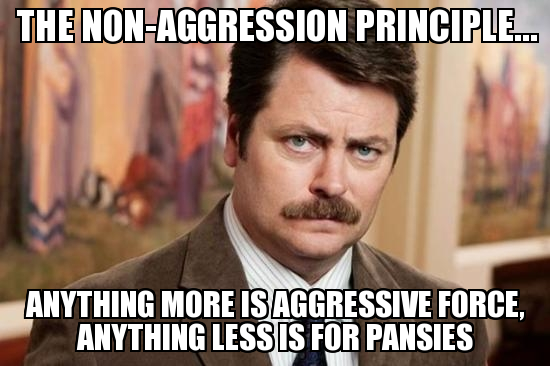
This concept of no aggressive actions being taken by individuals is better known as the "Non-Aggression Principle", or the NAP for short. It is a principle all libertarians at least should be aware of, and ideally follow with diligence. As an ethical principle, it works exceeding well to generally improve everyone's quality of life. After all, if no one individual is using aggression in society, every action must have been agreed to by those involved in them voluntarily.
PROBLEM 5: IDENTIFYING AGGRESSION
This may seem like a "no brainer" for some, and hopefully for most, but in actuality it is a bit more subtle. After all, not all acts of aggression are inherently violent - fraud and trespass are two such form of non-violent aggression. Therefore, aggression must apply to something apart from violence alone. So how can we properly identify when an act of aggression has occurred?
AXIOM 5: All Violations of Negative Rights are Aggressive
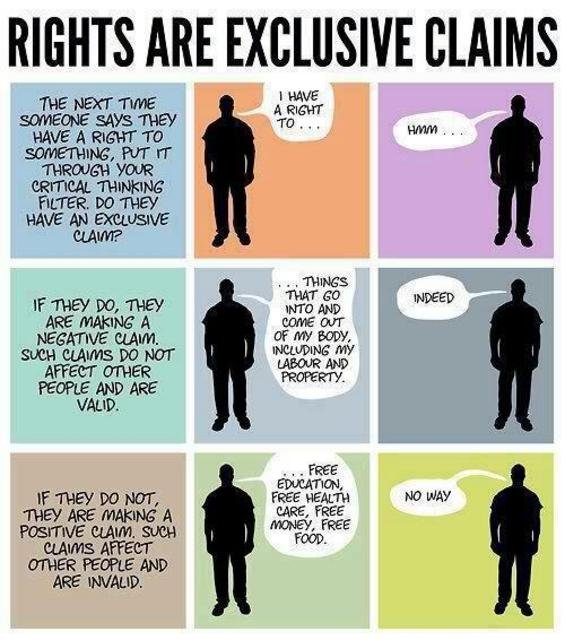
This axiom covers all the crimes that have actual victims, but requires an in depth understanding of how rights work in order to assess criminality. As it also requires bespoke axioms & proper definitions regarding rights in order to define their usability in society. I will be covering the inferences of this axiom in Part II of this series.
With these 5 axioms, we can begin to assess a proper structure for jurisprudence, identify right and wrong, determine how to behave freely, and develop a better understanding of our fellow sapient beings. The next step will be to define how rights are evolved, how they interact with each other, and the intricacies of how they actually function. With that, and the above axioms, we should be able to craft a framework for a truly free society.
hi great post keep up the good work =]
Downvoting a post can decrease pending rewards and make it less visible. Common reasons:
Submit